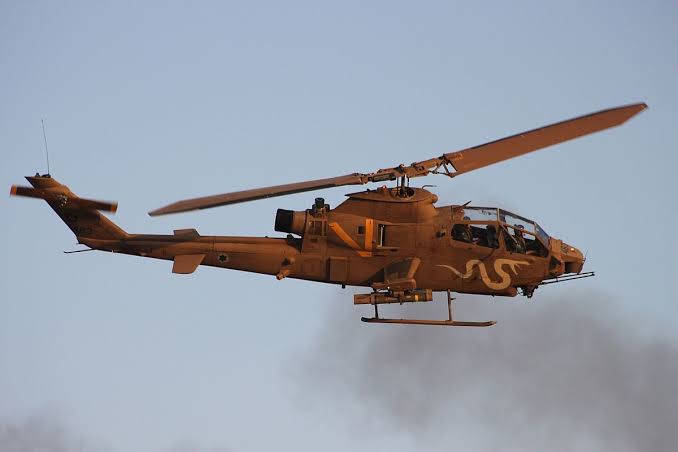Once again, United States major arms sale to Nigeria -which is fighting several significant internal security threats, is now in the spotlight.
United States senators are attempting to halt a proposed sale of military equipment worth some $875 million and comprising of the proven AH-1 Cobra attack helicopter to Nigeria following accusations of human rights violations committed by President Muhammad Buhari administration.
Democrat and Republican on the Senate Foreign Relations Committee have delayed the 12 AH-1 Cobra helicopters and other defense systems from being sold to Nigeria.
The sale also includes 28 helicopter engines produced by GE Aviation, 14 Honeywell military-grade aircraft navigation systems, and 2,000 advanced precision kill weapon systems (APKWS) laser-guided rocket rockets.
The AH-1 Cobra helicopter, designated Tzefa in the Israeli Air Force first entered service in 1975. On 2 August 2013, as part of the Israeli Defense Force’s budget cut plans, and the Cobra’s age which has resulted in a number of major accidents, the fleet was decommissioned.
The lawmakers are asking the President Joe Biden administration to reassess U.S.-Nigeria relations amid human rights concerns, stating that Nigerian President Muhammadu Buhari is drifting toward authoritarianism.
In a June 8, 2021 briefing by U.S. Senator Bob Menendez (D-N.J.), Chairman of the Senate Foreign Relations Committee on the review of the Fiscal Year 2022 State Department Budget Request, the lawmaker stated regarding Nigeria that it required a fundamental rethink of the framework of our overall engagement.
Nigeria is facing several security challenges including; an insurgency in the northeast which has entered its 12 years, bandits that now possess enough firepower to shoot down an Air Force Alpha jet, a spate of kidnapping-for-ransom campaigns targeting schoolchildren, as well as a herder-farmer crisis.
Although, the Nigerian military repeatedly dismissed reports on human rights abuses by its soldiers as baseless however, Western governments and international human rights organisations have consistently criticized the Nigerian government of heavy-handed approach to solving problems especially at the wake of the Twitter ban, the systematic corruption in the country, and the Nigerian military’s role in deadly crackdowns on #EndSARS protesters last October.
Earlier this year, Nigerian government earmarked N1.93 billion ($4,866,180.00) for ‘WhatsApp Intercept Solution’ and N2.93 billion was for ‘Thuraya Interception Solution,’ a communications system used for monitoring voice calls.
The United States which is a major arms supplier to Nigeria usually evaluated each sale on a case-by-case basis. For instance, in 2014, Former U.S. President Barack Obama’s administration prevented the sale of US-made Cobra military helicopters from Israel to the Nigerian government for its fight against Boko Haram, stating at the time that it had to review the sale to determine its “consistency with US policy interests.”
That same period, the United States also stopped the sale of CH-47 Chinook heavy lift transport helicopters.
Also, the U.S. initially prevented the Nigerian military from acquiring the A-29 Super Tucano light attack aircraft from Brazil.
Congressman Darrel Isah had said at the time that Leahy Law prohibits the U.S. defence sector from providing military assistance to countries involved in rights violations.
Likewise in 2017, the United States and its British ally withdrew the visas of some top Nigerian Military officers citing their complicity in various human rights abuses. The Nigerian Military however set up a Board of Inquiry with the sole task of investigating the accusation, but nothing came out of it.
Although, following a relaxation of its rules in 2017, then-U.S. President Donald Trump’s administration sold 12 A-29 Super Tucano light attack aircraft to Nigeria, with the first batch of the aircraft arriving earlier this month.
In the current practice, for a sale to be made, the State Department notifies Congress through the Senate Foreign Relations Committee and House Foreign Affairs Committee (HFAC), and If committee members raise any concerns about the proposed sale, the committees can freeze the sale until they receive satisfactory answer.
However, this method is slow, sometimes taking months or even years. Even at that, some lawmakers are now looking to further extend congressional oversight over U.S. arms sales, by giving Congress the power to approve sales to foreign countries.
